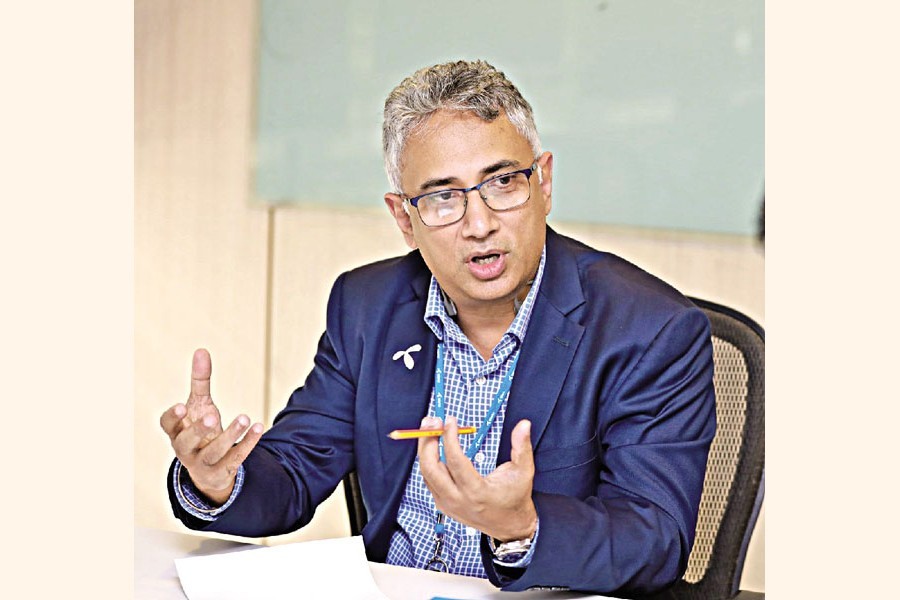The country's largest mobile network operator, Grameenphone, has faith in Bangladesh's potential and looks forward to contributing to its long-term development, says the company's top executive.
He notes that the mobile-phone firm has been a partner to Bangladesh's growth for the past 25 years and it is prepared for the next 25 years.
"We are looking forward to finding out a way together to deliver on the vision 2041 of the Bangladesh, the Smart Bangladesh, where connectivity and digitisation will play a key role," says Yasir Azman, chief executive officer of Grameenphone.
In an interview with The Financial Express, the first-ever Bangladeshi CEO of the mobile multinational said completing 25 years is a significant milestone for GP. However, customers only can better tell about the impact and contribution of Grameenphone for them and the nation.
With innovation, service, mobile connectivity, and affordability, Grameenphone won the hearts of millions of people across the nation. GP made mobile connections affordable for commoners with prepaid-to-prepaid innovative service and call rate for the first time to around Tk 7 per minute.
"It was very cheap compared to when the call per minute was around Tk 25 to 26," Azman said, adding that their objectives were to make the call rate below Tk 1 per minute, connect the whole nation, and ensure true empowerment for everyone.
"We may have 46 per cent of customers, but every family has a GP connection now," the proud GP CEO said, and the reason is achieving the target of making call rate below Tk 1 per minute.
Initially women empowerment was one of the objectives when GP embarked on its journey in 1997. But the MNO gradually evolved to complete digital-connectivity solutions.
"Customers' behavioral changes and technological shift both contributed to Grameenphone's evolution over the time," he said.
The GP CEO said the unique part of Bangladesh for Telenor is they started their journey in Asia through Bangladesh.
Bangladesh market is significantly different than other markets according to market share, the number of shares, and customer confidence.
When no one believed that it was possible to ensure connectivity services in rural Bangladesh, Telenor and Grameenphone made a robust investment in this market at that time. The trust in the brand in this market is very strong.
"So, Bangladesh and Grameenphone are very special to Telenor," he said.
He said Grameenphone is highly focused on nurturing people, evolving the organisation, and developing customer-centric and ethical leadership culture.
"From the beginning of our journey until today, following the same governance and way of work, Grameenphone has served customers with an innovative and agile mindset."
Taking the long-term benefits of the country into account and believing in Bangladesh, he said, Grameenphone has entered the capital market.
The CEO alleged that many people in many places are using illegal wireless equipment like jammers, repeaters and boosters, which is greatly hampering network flow and causing problems to other users.
"We want to request people through you to refrain from using such equipment so that we can provide uninterrupted network experience," he said.
He reminds that only spectrum cannot ensure 5G launch -- fiber, towercos, device makers and other ecosystem partners also need to be ready for 5G.
"I would say, we are ready for tests and trials, but not for the commercial introduction of 5G in the Bangladesh market. But, eventually, we shall get ready for that within a year or two, and we are really looking forward to it."
However, the guidelines for the commercial 5G launch are not yet available. "We are working on it with regulator."
Mentioning poor return on heavy investment and common negativity about making profits, he said, "We need to build awareness regarding the fact that high investment requires high return."
The GP CEO said the profitability from data-based connectivity is not as much as MNOs made for the voice connectivity.
"We cannot offer the right digital services through the right payment solutions and we cannot expect the business to sustain capitalizing on only the basic voice services," he added.
Yasir Azman also said realising the Digital Bangladesh vision would be a very integral part of the "Smart Bangladesh" vision that they are here to talk about today.
Grameenphone contributed more than Tk 900 billion to the national exchequer. This year, 70 per cent of its revenue has gone to the national exchequer in the form of tax, VAT, supplementary duty and other regulatory charges.
With 84 million subscribers, GP is a joint venture between Telenor and Grameen Telecom Corporation. Telenor, a telecommunications company from Norway, owns a 55.8-per cent share of Grameenphone while Grameen Telecom owns 34.2 per cent and the remaining 10 per cent is publicly held. The company started operations on 26 March 1997, the Independence Day in Bangladesh.


